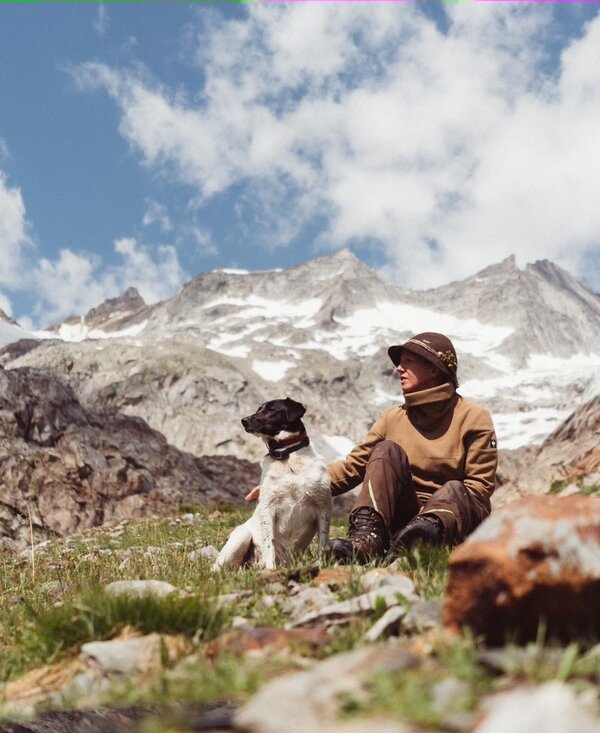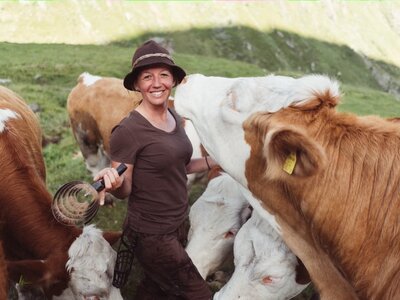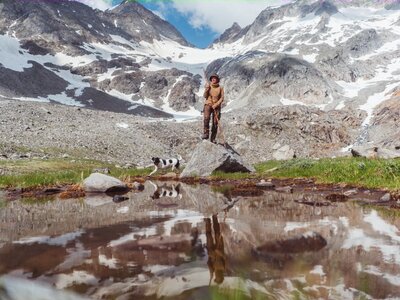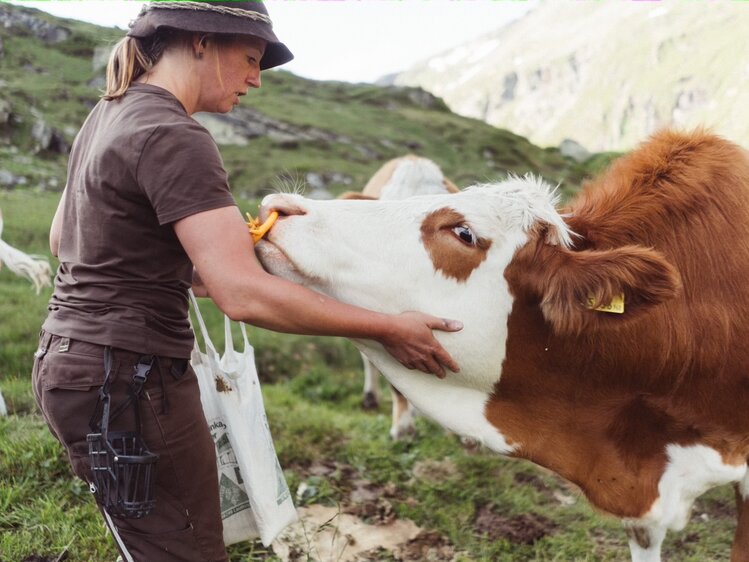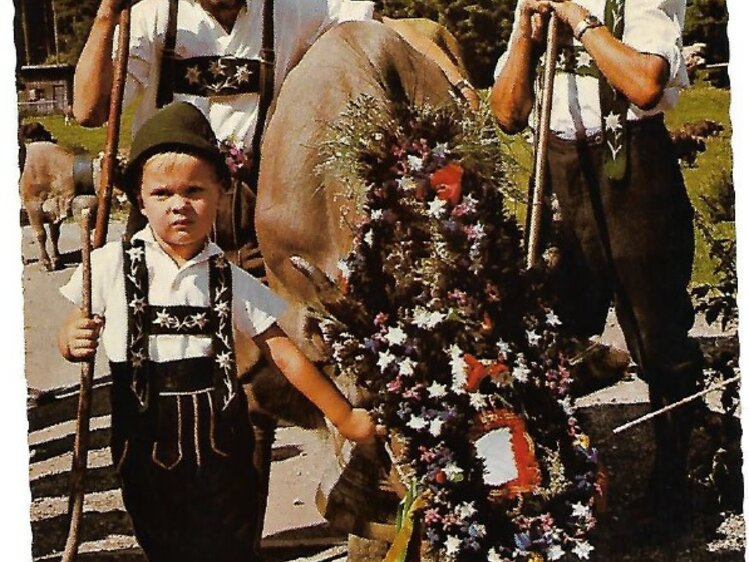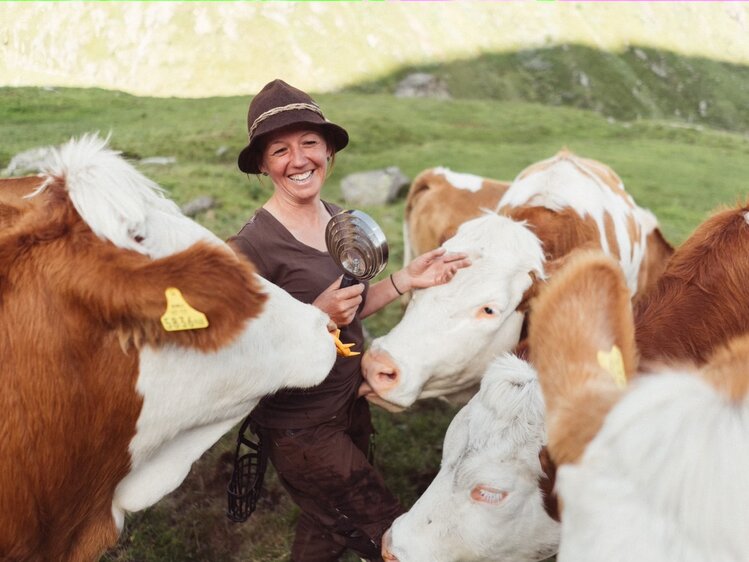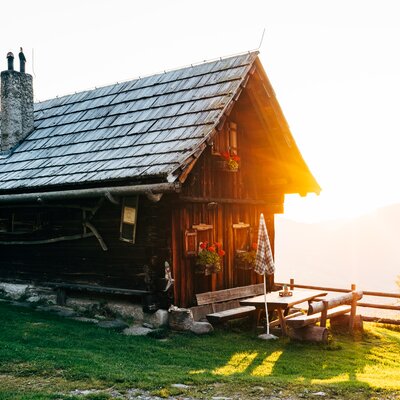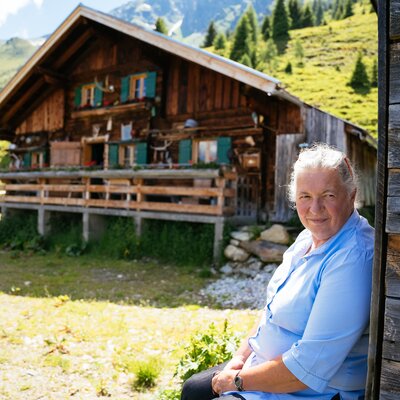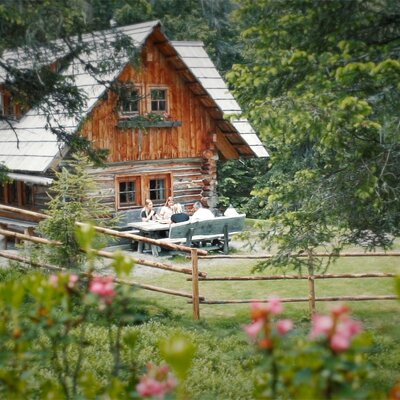Christina Gollner initially worked in a very challenging job straight after completing her business studies, which she says she did quite ambitiously, and then went on to complete extensive training. At the time, she still thought that was the right thing to do. But a few years later, she increasingly felt like she was stuck in the infamous hamster wheel and letting life pass her by. She felt more and more tired and exhausted, and was on the verge of simply quitting her well-paid job at the time. She longed for a simple life, she wanted to reduce the abundance and stress in her life, to live more with, from and in nature. In a word, something had to be done!
And it happened, but only with her own help and determination. She had always loved being outdoors, loved nature and the mountains. Not so surprising, by the way, as she lives near Lienz in East Tyrol with the peaks all around within sight. Speaking of peaks, Christina says: "When I'm standing on a peak, I can't go anywhere, I'm just with myself." And at some point in between, she had the idea that would save her: she wanted to become a dairymaid! She has now spent four whole summers on alpine pastures.
She spent the first of her alpine summers on the Tröpolacher Alm in the Carnic Alps. She was "graciously" employed there as an absolute amateur, as she says today with a laugh. This alpine pasture has an extensive cheese dairy ("Gailtaler Almkäse g. U.") with a fairly large restaurant. Christina wasn't really interested in either of these, one because of her lack of knowledge and skills, the other because it wasn't really in her interest. But the "critters" were! She was able to prove herself as a beginner in looking after the animals, felt she was in the right place and quickly acquired good practical knowledge.
In the second summer, she was already braver and took over what is now known as pasture management as a shepherdess on the Maureralm. The Maureralm is located in the Maurertal valley in East Tyrol. Valley my ass! Christina herself describes it very specifically and down-to-earth as rocky, high alpine and ditch-like. Anyone who has ever hiked over the Maureralm to the Essener-Rostocker-Hütte will confirm this. Over the past three summers, Christina has looked after 30 to 48 one- to two-year-old young cattle here. The number depended on how many animals the farmers sent to the alpine pasture.
And how can you imagine this care by the shepherdess? The young cattle are kept in fenced-in paddocks on this alpine pasture. This means that the animals graze in other parts of the pasture by means of fences that are constantly being erected. The shepherdess has the task of selecting these paddocks, erecting the fences, taking the animals there and monitoring them. And all this eight to nine times in one summer! Of course, the animals are constantly being looked after. You can imagine that the shepherdess has to cover quite a few kilometers and meters in altitude. That's hard work! "Yes, it is," Christina admits honestly. "The hardest part is hauling the fence posts, which are called Strempfel here. But through what is called training in sport, you get better and better and can carry an ever-increasing number of stakes, which in turn saves kilometers and meters of altitude," Christina continues.
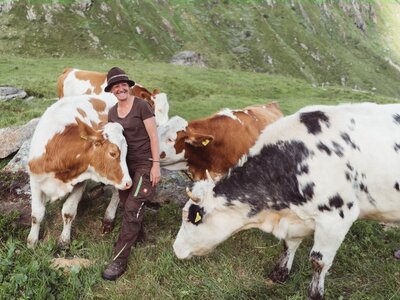
Happy despite the drudgery?
Christina is grateful - for her job as an accountant, which she has enjoyed for years, and for her very special summer job: as a shepherdess on the mountain pasture. In the summer months, she swaps her office for the mountains and works for a farming community, where she is registered as an agricultural assistant and, of course, insured. Her main employer supports this path - both sides are happy every year when Christina returns in the fall.
After four alpine seasons, Christina looks back on her decision with satisfaction. "At the moment, I can't imagine not working on the mountain pasture again in summer. It would probably be the end of the world for me," she says with a smile. And yet she knows that this physically demanding work in the mountains won't be possible forever - even though she is only forty. "But who knows what will come. Nobody will take my alpine experience away from me."
Her time on the mountain pasture has shaped Christina. "I've become much more human as a person, I've learned for life and I'm much more grateful for many things," she says thoughtfully. The hamster wheel of everyday life? No longer an issue for her. "I now know that I can stop it at any time. My former ambition has been severely curbed - and that's good for me." The past few summers in the mountains have made Christina a happier person. And the longing for the next alpine summer remains.
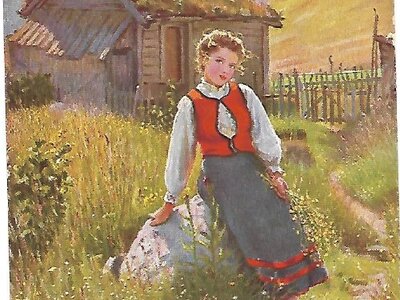
A realistic look at alpine pasture practice
Barbara Kircher, Carinthia's Alpine pasture inspector, knows exactly what she is talking about. She lists the qualities that she believes are absolutely essential if you want to do a shepherd's job or seasonal work on the mountain pasture in general.
Reliability is her top priority. Dealing with animals - especially farm animals such as cattle, sheep and goats - should be a pleasure. Anyone who lets bad weather spoil their mood is out of place on the mountain pasture. It should also be easy to do without comfort - because life on the mountain pasture is simple and often challenging.
"You have to be down-to-earth and independent," says Kircher. In addition, you shouldn't mind spending long periods alone in seclusion. A certain amount of decisiveness is also required - after all, you often have to act spontaneously and correctly, especially when dealing with animals.
Is that too much to ask? Barbara Kircher takes a realistic view: "Yes, it is a lot. Unfortunately, there's certainly no room for romantic notions."
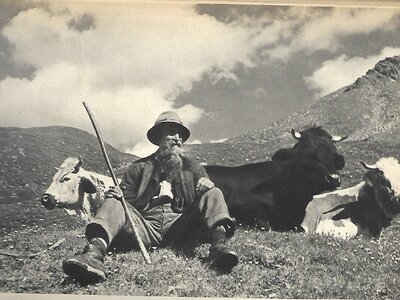
Those who dream of spending a summer on the mountain pasture often ask themselves: How do you become a dairyman or dairywoman? And what jobs are there on the mountain pasture? One thing is clear: whether you're a man or a woman, commitment and team spirit count on the alpine pasture. Together they form the alpine pasture staff, who almost feel like a ship's crew - only on the "Almschiff".
Here is an overview of the most important activities:
Herdsman - in some areas also called keeper or ochsner. These people look after the grazing livestock, similar to Christina in the report described above. They look after the welfare of the animals and check the grazing areas.
Milkers, dairymen or cheesemakers - they are mainly responsible for milk processing on the mountain pasture. Milking the cows and making cheese or butter are among their core tasks.
Alpine dairyman - an all-round talent on the mountain pasture. In addition to the cattle, milk processing is also part of the daily tasks. Depending on the mountain pasture, this may also include catering for guests - for example, when hikers or vacation guests visit the mountain pasture.
Anyone who wants to start life and work on a mountain pasture as a career changer should acquire the relevant knowledge. Basic training at the Rural Training Institute (LFI) in cooperation with the Alpine Farming Association provides a good basis. There you learn the most important "alpine pasture subjects":
General insight into alpine pasture farming
Livestock husbandry and livestock health
Alpine pasture vegetation science
Labor and tax law issues for alpine pasture staff
Special topics such as making alpine decorations for the cattle drive
With this training, there is a good chance that you will soon be able to spend a season on an alpine pasture as a shepherd, dairyman or cheesemaker - and swap real mountain air for everyday office life.
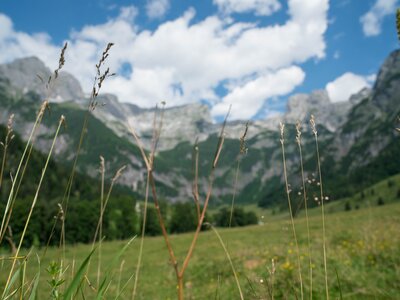
Christina Gollner has also completed the basic training for alpine pasture staff - and finds it simply indispensable. "The training is very helpful to start the alpine pasture season prepared," she says. But the experienced alpine pasture inspector Barbara Kircher also knows that theory alone is not enough. Around half of the graduates of this special training course have actually been able to start out in practice as shepherds, dairymen or cheesemakers in recent years.
Both Kircher and Gollner agree: no matter how good the preparation is, what counts in the end is the practice on the mountain pasture. Working on the mountain pasture means being thrown in at the proverbial deep end. Except that the "cold water" here is the mountain pasture itself - with all its challenges and special fascination.
Notburga Samrock
12 Article(s)
